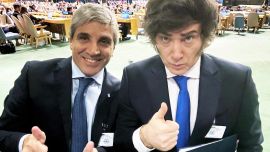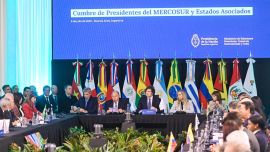“I am a villero. It is what I have been my entire life and it is what I will be until the day I die.”
On a weekend where almost the entirety of public discourse centred around the message of staying at home, the second anniversary of the great René Houseman’s death on Sunday was unjustly overlooked by many. But the slogan is perhaps fitting, for despite living a wayward, semi-nomadic existence, the ex-Huracán and Argentina idol was driven by a fierce sense of belonging: not just to his own home, but to every villa miseria, every shantytown that dots the landscape of the nation.
Houseman was born on July 19, 1953, in the province of Santiago del Estero. At the age of seven, however, his family left the poverty of Argentina’s northwest for the bright lights of Buenos Aires, where they settled in the villa that sprawled around an open-air rubbish dump behind the Mitre railway lines in Bajo Belgrano, one of the city’s most affluent neighbourhoods. Even while El Loco was coming up the ranks, first at boyhood heroes Excursionistas and later at Defensores del Belgrano, he continued to call the deprived, makeshift Bajo home.
“René did not want to give up the villa,” his sister Ema told Infobae shortly after his death. “The villa was everything to him. All of his friends were there.”
Even when César Luis Menotti, the coach who would take him to fame first with Huracán, and later with the 1978 World Cup-winning Albiceleste side, offered to help Houseman buy a house in a more salubrious town, there was still no convincing him. “We went, we looked and it came to nothing, he wasn’t going to leave the villa...
In the end he got an apartment on Monroe and Dragones, two blocks from the villa,” recalled Menotti. In 1978 Houseman was at the peak of his powers. Widely regarded as the greatest winger ever to pull on the Argentina shirt, he had led Huracán to their first-ever Primera División title five years earlier and was also one of the bright spots in an otherwise disappointing World Cup for the Albiceleste in West Germany the following year.
When football’s biggest competition came to Argentina he played all but one of their matches as the team, coached by Menotti and captained by Daniel Passarella, prevailed over the Netherlands to take the prize. The star’s memories of that tournament, however, were forever tainted by what was going on in the country.
The murderous dictatorship led by Jorge Rafael Videla had earlier that year overseen a campaign to hide Argentina’s poverty from international visitors, flattening Buenos Aires’ most prominent villas in an uncompromising process of social cleansing; El Loco’s Bajo Belgrano was one of the sites earmarked for destruction.
“They came with a bulldozer to smash your house down and a truck to take you and your things,” Ema Houseman recalled. “They shoved you on the truck and you had to go.”
“The military and its bulldozers ruined my world and that of many people I cared for. They destroyed me. That was the most painful story of my life,” Houseman later explained to La Poderosa, a magazine and charity that defends the rights of Argentina’s villas and the informally housed populations within.
The footballer once swore that, if he had known the extent of the military dictatorship’s crimes, he would never have taken part in the World Cup, which was stage-managed from start to finish as a glossy propaganda exercise by Videla and his minions, while thousands of activists were disappeared in clandestine concentration camps.
The memory of shaking hands with the military chief particularly haunted him, and when asked if he would do it again he fired: “I would prefer to cut my hand off, right now.”
Houseman had always struggled with indiscipline, with both Huracán and Argentina repeatedly suffer ing his sudden, unexplained absences – usually, he could be found back on the streets of the villa, visiting old friends or playing impromptu potrero games. His greatest demon, however, was drink: alcoholism plagued El Loco throughout his playing days and came close to killing him at the age of 40, when he spent almost a month in hospital in a bid to kick his addiction.
Once clean he threw himself into charity work, particularly with La Poderosa, for whom he covered the 2014 World Cup in Brazil – insisting that he stay not in a hotel, but in a Rio de Janeiro favela.
He continued to represent youths like himself, from Argentina’s most deprived, precarious neighbourhoods, until the end of 2017 when he was diagnosed with tongue cancer; El Loco finally lost his battle against the disease on March 22, 2018, aged 63.
Houseman was the ‘homeless footballer,’ whose only real home was cruelly ripped away from him by soldiers and bulldozers; but on the pitch and off it, and despite his demons, he dedicated his life to bringing joy to his fellow inhabitants of the villa, fighting to the end so that they could live with pride and dignity.

























Comments